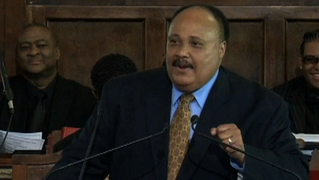
Topics
Today is Martin Luther King, Jr.’s Day. He was born in 1929. Last week, he would have turned 75 years old.
It’s become a TV ritual: Every year in mid-January, around the time of his birthday, we get perfunctory network news reports about “the slain civil rights leader.”
The remarkable thing about this annual review of King’s life is that several years — his last years — are totally missing, as if flushed down a memory hole.
What TV viewers see is a closed loop of familiar file footage: King battling desegregation in Birmingham (1963); reciting his dream of racial harmony at the rally in Washington (1963); marching for voting rights in Selma, Alabama (1965); and finally, lying dead on the motel balcony in Memphis (1968).
An alert viewer might notice that the chronology jumps from 1965 to 1968. Yet King didn’t take a sabbatical near the end of his life. In fact, he was speaking and organizing as diligently as ever.
Almost all of those speeches were filmed or taped. But they’re not shown today on TV.
In the early 1960s, when King focused his challenge on legalized racial discrimination in the South, most major media were his allies. Network TV and national publications graphically showed the police dogs and bullwhips and cattle prods used against Southern blacks who sought the right to vote or to eat at a public lunch counter.
But after passage of civil rights acts in 1964 and 1965, King began challenging the nation’s fundamental priorities. He maintained that civil rights laws were empty without “human rights” — including economic rights. For people too poor to eat at a restaurant or afford a decent home, King said, anti-discrimination laws were hollow.
Noting that a majority of Americans below the poverty line were white, King developed a class perspective. He decried the huge income gaps between rich and poor, and called for “radical changes in the structure of our society” to redistribute wealth and power.
By 1967, King had also become the country’s most prominent opponent of the Vietnam War, and a staunch critic of overall U.S. foreign policy, which he deemed militaristic. In his “Beyond Vietnam” speech delivered at New York’s Riverside Church on April 4, 1967 — a year to the day before he was murdered — King called the United States “the greatest purveyor of violence in the world today.”
Time magazine called the speech “demagogic slander that sounded like a script for Radio Hanoi,” and the Washington Post declared that King had “diminished his usefulness to his cause, his country, his people.”
Martin Luther King. His speech Beyond Vietnam, delivered on April 4, 1967 a year to the day before he was assassinated at the Lorraine Motel in Memphis, Tennessee. On the day of King’s assassination, Robert Kennedy was in Indianapolous, Indiana campaigning for president. He announced the assassination of Martin Luther King on April 4, 1968. The night before he was killed, King gave his last major address in Memphis, Tennessee. He was there to support striking sanitation workers as he built momentum for a Poor Peoples March on Washington. Here is Martin Luther King “I Have Been to the Mountain Top.”












Media Options